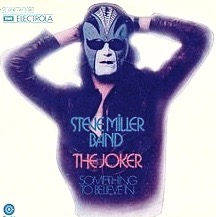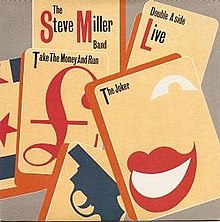The Joker (Steve Miller Band song)
| "The Joker" | ||||
|---|---|---|---|---|
 | ||||
| Single by Steve Miller Band | ||||
| from the album The Joker | ||||
| B-side | "'see track listings'" | |||
| Released | October 20, 1973[1] | |||
| Recorded | August 1973 | |||
| Genre | ||||
| Length |
| |||
| Label | Capitol | |||
| Songwriter(s) | ||||
| Producer(s) | Steve Miller | |||
| Steve Miller Band singles chronology | ||||
| ||||
| "Take the Money and Run"/"The Joker" (1983, double A-side, live) | ||||
 Cover of the 1983 live single | ||||
| Steve Miller Band singles chronology | ||||
| ||||
| Steve Miller Band singles chronology | ||||
| ||||
"The Joker" is a song by the Steve Miller Band from their 1973 album The Joker. It is one of two Steve Miller Band songs that feature the nonce word "pompatus". Released as a single on October 20, 1973, the song topped the US Billboard Hot 100 in early 1974 and reached the top 20 in Australia, Canada, and the Netherlands.
More than 16 years later, in September 1990, "The Joker" reached number one on the UK Singles Chart for two weeks after being used in "Great Deal", a Hugh Johnson-directed television advertisement for Levi's, thus holding the record for the longest gap between transatlantic chart-toppers. This reissue of "The Joker" also topped the Irish Singles Chart, the New Zealand Singles Chart, the Dutch Nationale Top 100, and the Dutch Top 40.
The first line of the lyrics is a reference to the song "Space Cowboy" from Miller's Brave New World album. The following lines refer to two other songs: "Gangster of Love" from Sailor and "Enter Maurice" from Recall the Beginning...A Journey from Eden.
Inspiration and writing
The song's accompaniment is borrowed heavily from the song "Soul Sister" By Allen Toussaint. During the song, Steve Miller references The Clovers' 1954 song "Lovey Dovey" when he sings "You're the cutest thing that I ever did see / Really love your peaches, wanna shake your tree / Lovey dovey, lovey dovey, lovey dovey all the time".
The song is noted for its wolf whistle played on a slide guitar after the "lovey dovey" parts and the "some people call me Maurice" part.
The line "some people call me Maurice / 'Cause I speak of the pompatus of love" was written after Miller heard the song "The Letter" by The Medallions. In "The Letter", writer Vernon Green made up the word puppetutes, meaning a paper-doll erotic fantasy figure;[2] however, Miller misheard the word and wrote pompatus instead.[3]
Track listings
7-inch single (1973)
- "The Joker" – 3:36
- "Something to Believe In" – 4:40
7-inch single (1983 – live version)
- "The Joker" (live) – 2:55
- "Take the Money and Run" (live) – 3:49
7-inch single (1990)
- "The Joker" (single version) – 3:34
- "Don't Let Nobody Turn You Around" – 2:27
12-inch maxi (1990)
- "The Joker" (LP version) – 4:22
- "Don't Let Nobody Turn You Around" – 2:27
- "Shu Ba Da Du Ma Ma Ma" – 5:39
CD maxi (1990)
- "The Joker" (single version) – 3:34
- "Don't Let Nobody Turn You Around" – 2:27
- "Shu Ba Da Du Ma Ma Ma Ma" – 3:33
- "Living in the U.S.A." – 3:59
Personnel
- Steve Miller – guitar, lead vocals
- Gerald Johnson – bass, backing vocals
- Dick Thompson – organ
- John King – drums
Charts
Weekly charts
|
Year-end charts
All-time charts
|
Certifications
| Region | Certification | Certified units/sales |
|---|---|---|
| Sweden (GLF)[32] | Gold | 25,000^ |
| United Kingdom (BPI)[33] | Silver | 200,000^ |
| United States (RIAA)[34] | Gold | 1,000,000^ |
|
^ Shipments figures based on certification alone. | ||
References
- ^ Dio, Ray (October 20, 1990). "Raydio" (PDF). Music & Media. Vol. 7, no. 42. p. 25. Retrieved November 14, 2020.
- ^ 'In Steve Miller's "The Joker," what is "the pompatus of love"?'
- ^ "S03E06". Never Mind the Buzzcocks. BBC2.
- ^ Kent, David (1993). Australian Chart Book 1970–1992. St Ives, NSW: Australian Chart Book. ISBN 0-646-11917-6.
- ^ "Top RPM Singles: Issue 4963a." RPM. Library and Archives Canada. Retrieved November 13, 2020.
- ^ "Nederlandse Top 40 – week 47, 1973" (in Dutch). Dutch Top 40. Retrieved November 13, 2020.
- ^ a b "Steve Miller Band – The Joker" (in Dutch). Single Top 100. Retrieved November 13, 2020.
- ^ "The Steve Miller Band Chart History (Hot 100)". Billboard. Retrieved November 13, 2020.
- ^ "Steve Miller Band – The Joker" (in German). Ö3 Austria Top 40. Retrieved November 13, 2020.
- ^ "Steve Miller Band – The Joker" (in Dutch). Ultratop 50. Retrieved November 13, 2020.
- ^ "Eurochart Hot 100 Singles" (PDF). Music & Media. Vol. 7, no. 38. September 22, 1990. p. IV. Retrieved November 14, 2020.
- ^ Nyman, Jake (2005). Suomi soi 4: Suuri suomalainen listakirja (in Finnish) (1st ed.). Helsinki: Tammi. ISBN 951-31-2503-3.
- ^ "Steve Miller Band – The Joker" (in French). Les classement single. Retrieved November 13, 2020.
- ^ "Steve Miller Band – The Joker" (in German). GfK Entertainment charts. Retrieved November 13, 2020.
- ^ "The Irish Charts – Search Results – The Joker". Irish Singles Chart. Retrieved November 13, 2020.
- ^ "Nederlandse Top 40 – week 44, 1990" (in Dutch). Dutch Top 40. Retrieved November 13, 2020.
- ^ "Steve Miller Band – The Joker". Top 40 Singles. Retrieved November 13, 2020.
- ^ "Steve Miller Band – The Joker". VG-lista. Retrieved November 13, 2020.
- ^ "Steve Miller Band – The Joker". Singles Top 100. Retrieved November 13, 2020.
- ^ "Steve Miller Band – The Joker". Swiss Singles Chart. Retrieved November 13, 2020.
- ^ "Steve Miller Band: Artist Chart History". Official Charts Company. Retrieved November 13, 2020.
- ^ "The Top 200 Singles of '74". RPM. Library and Archives Canada. Retrieved November 14, 2020.
- ^ "Billboard Top 100 – 1974". Billboardtop100of.com. Retrieved November 14, 2020.
- ^ "Jaaroverzichten 1990" (in Dutch). Ultratop. Retrieved November 14, 2020.
- ^ "Eurochart Hot 100 of 1990" (PDF). Music & Media. Vol. 7, no. 51. December 22, 1990. p. 60. OCLC 29800226. Retrieved January 15, 2020 – via World Radio History.
- ^ "Jaaroverzichten – Single 1990" (in Dutch). MegaCharts. Retrieved November 14, 2020.
- ^ "1990 Top 100 Singles". Music Week. London, England: Spotlight Publications. March 2, 1991. p. 41.
- ^ "Eurochart Hot 100 1991" (PDF). Music & Media. Vol. 8, no. 51–52. December 21, 1991. p. 21. Retrieved January 17, 2020 – via World Radio History.
- ^ "Top 100 Singles–Jahrescharts 1991" (in German). GfK Entertainment. Retrieved November 14, 2020.
- ^ "End of Year Charts 1991". Recorded Music NZ. Retrieved December 3, 2017.
- ^ "Billboard Hot 100 60th Anniversary Interactive Chart". Billboard. Retrieved December 10, 2018.
- ^ "Guld- och Platinacertifikat − År 1987−1998" (PDF) (in Swedish). IFPI Sweden. Archived from the original (PDF) on May 17, 2011. Retrieved November 14, 2020.
- ^ "British single certifications – Steve Miller Band – The Joker". British Phonographic Industry. Retrieved November 14, 2020.
- ^ "American single certifications – Steve Miller Band – The Joker". Recording Industry Association of America. Retrieved November 14, 2020.
External links
- The Straight Dope: In Steve Miller's "The Joker," what is "the pompatus of love"?
- Language Log: Dismortality and puppetutes—post on the etymology of "pompatus".
- Template:MetroLyrics song
- 1973 singles
- 1973 songs
- 1974 singles
- 1990 singles
- 2007 singles
- Astralwerks singles
- Billboard Hot 100 number-one singles
- Capitol Records singles
- Dutch Top 40 number-one singles
- Fatboy Slim songs
- Irish Singles Chart number-one singles
- Number-one singles in New Zealand
- Single Top 100 number-one singles
- Songs about cannabis
- Songs written by Ahmet Ertegun
- Songs written by Eddie Curtis
- Songs written by Steve Miller (musician)
- Steve Miller Band songs
- Tim McGraw songs
- UK Singles Chart number-one singles
- Warner Records singles
